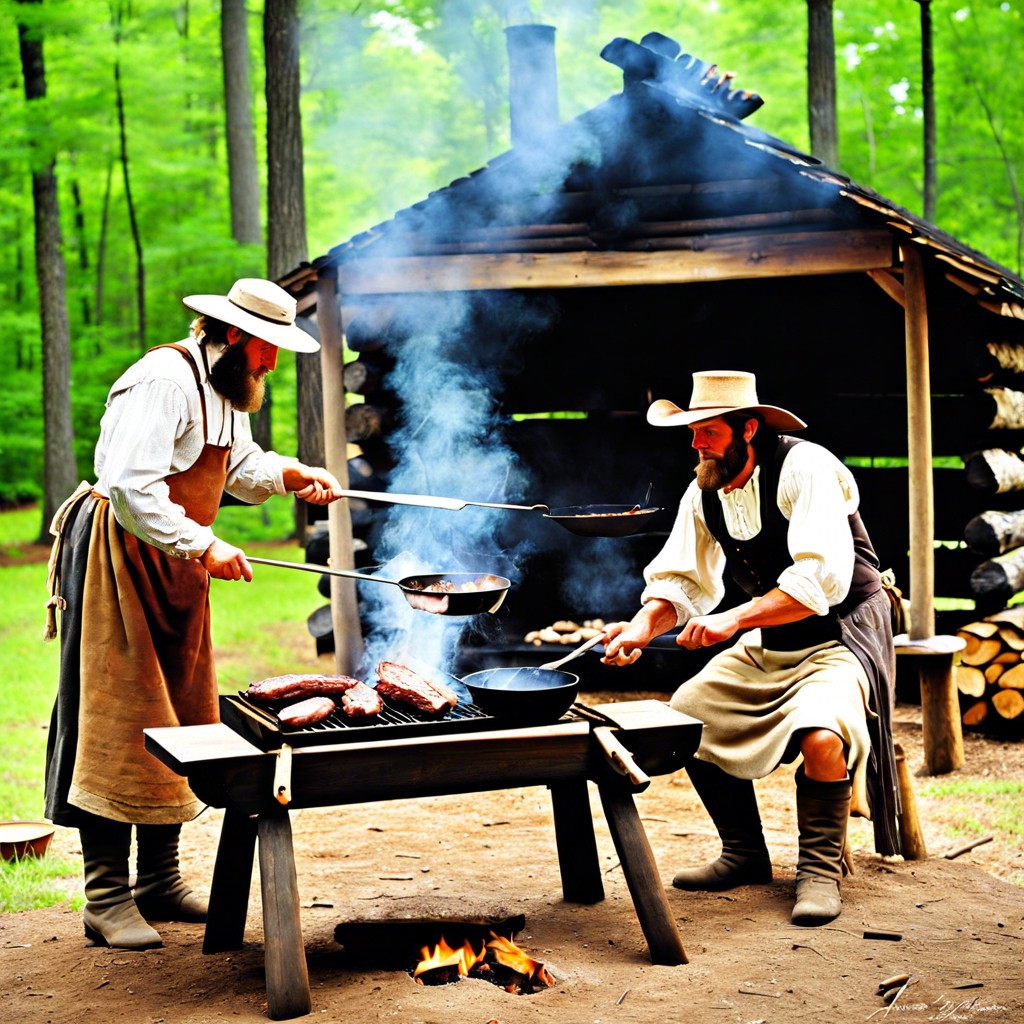This article unravels the flavors and techniques that make Carolina-style BBQ a standout tradition in Southern cuisine.
Key takeaways:
- Carolina style BBQ developed from a convergence of cultures.
- Carolina style BBQ has two main variations: Eastern and Lexington.
- Pork is the primary meat of choice for Carolina style BBQ.
- Low and slow cooking is essential for mastering Carolina style BBQ.
- Must-visit Carolina BBQ joints include Skylight Inn, Lexington Barbecue, Allen & Son Barbeque, and Red Bridges Barbecue Lodge.
Historical Roots of Carolina Style BBQ

Hailing from a tradition as old as American barbecue itself, Carolina style developed from a convergence of cultures in the colonial era. Indigenous peoples introduced early settlers to slow-cooking meats over a pit, and these techniques evolved as they combined with European and African practices. The result? A distinct approach to BBQ that prioritizes pork and a vinegar-based sauce.
This centuries-old culinary tradition thrived largely due to the region’s affinity for whole-hog barbecuing, a method requiring skillful control over heat and time. Vinegar, a plentiful resource in the Carolinas due to the widespread cultivation of apples, became a staple ingredient in the barbecue sauce, loved for its tangy kick that cuts through the richness of the pork.
The sauce’s hints of heat and sweetness can be traced back to the molasses brought over during the transatlantic trade. The melding of these influences gave rise to a barbecue style that emphasizes the natural flavor of the meat, complemented by the zesty character of the sauce—a true testament to the cultural melting pot that is the American South.
Defining Carolina Style BBQ: Eastern Vs. Lexington
The lingering feud between Eastern and Lexington style BBQ in Carolina can perplex even the most seasoned barbecue enthusiasts. On one hand, Eastern style is known for its whole-hog approach, where every part of the pig gets slow-cooked over a wood fire, symbolizing the epitome of traditional whole-animal utilization. This style slathers the meat with a thin, vinegar-based sauce spiked with pepper, delivering a tang that makes your tongue tango.
Conversely, Lexington style, or “Western Carolina” style, narrows its focus to pork shoulder, showcasing a type of specialization that has its own cult following. The sauce here takes a detour, marrying vinegar with the sweetness of ketchup or tomato sauce, creating a harmony that plays a sweet and savory symphony on the palate. Adding a dollop of red slaw, which gets its color from the same ketchup-based sauce, harmonizes the plate.
Understanding the siblings of Carolina BBQ is like appreciating different dialects of the same language. Each has its adherents, its customs, and its regional pride, yet both are inseparably part of the larger Carolina BBQ conversation.
Traditional Meats and Cuts for Carolina Style BBQ
Pork reigns supreme in Carolina BBQ, where whole hog and shoulder are staples. The Eastern tradition honors the hog in its entirety, smoked over oak or hickory until it whispers tenderness. On the flip side, Lexington style often zooms in on pork shoulder, glazed in a vinegar-based “dip” that infuses zest into every shred.
Beef brisket steps out occasionally, but it’s an outsider looking in—this is swine territory. True enthusiasts talk cuts and cooking times like others discuss the weather, fixated on the quest for perfect pull-apart succulence. They swap secrets on prep philosophies, from the rubs that set the stage to the wood smoke that sings backup, creating a chorus of flavors.
The meat selection isn’t complex; it’s the devotion to these selections that forges the identity of Carolina style BBQ. It’s a tradition held aloft by simplicity and smoke, where the quality of the cut and skill of the smoker intertwine, culminating in a symphony of taste served up on paper plates or butcher paper – humble presentations for a high form of culinary art.
Pitmasters’ Techniques: Low and Slow Cooking
Mastering the art of Carolina-style barbecue hinges on the time-honored low and slow cooking method. This technique transforms tougher cuts of meat into tender, pull-apart delicacies. The key lies in maintaining temperatures between 200-275 degrees Fahrenheit, nurturing the meat over a wood-fired pit. This indirect heat allows connective tissues to break down without charring the exterior.
Patience is the secret seasoning here. Hours pass—sometimes up to 18 for a whole hog—as the meat bathes in a smoky, aromatic sauna. During this culinary marathon, pitmasters are vigilant, never cranking up the heat for expediency. They understand that every second spent in the smoker permits a deeper infusion of flavor.
Timing is everything, and precision trumps haste. A watchful eye and a stable hand ensure meats are pulled off the fire at the peak of juiciness. When done right, the reward is a succulent, smoky masterpiece that cements Carolina BBQ’s prestigious reputation.
Must-Visit Carolina BBQ Joints
Exploring the landscape of Carolina BBQ, you’d be remiss if you didn’t stop by these iconic eateries that serve as shrines to smoked meat:
- Skylight Inn in Ayden: Often hailed as a ‘barbecue heaven’, Skylight Inn sticks to a time-honored tradition of whole-hog barbecue. The simplicity of their menu—featuring chopped pork with a splash of vinegar sauce—is a testament to their mastery.
- Lexington Barbecue in Lexington: Affectionately called ‘Honeymonk’ by locals, this spot is renowned for its dip—a vinegar-based sauce enriched with ketchup and spices, and its shoulder-cut servings. A pilgrimage here is necessary for anyone serious about barbecue.
- Allen & Son Barbeque in Chapel Hill: Nestled between the growth of modernity and bucolic countryside, Allen & Son melds hickory-smoked pork with a sauce that balances sweet and tangy notes.
- Red Bridges Barbecue Lodge in Shelby: This family-run institution boasts a sauce that harmonizes the stylistic differences found in Carolina BBQ. Their slow-cooked meats and homey sides exemplify southern hospitality.
Each location champions its approach to classic Carolina BBQ while inviting you to savor deeply-rooted culinary traditions. A visit offers more than just a meal; it’s a cultural immersion, with every bite encapsulating the rich tapestry of Carolina’s barbecue heritage.